‘Mrs. Harris’ shows how dreams come true
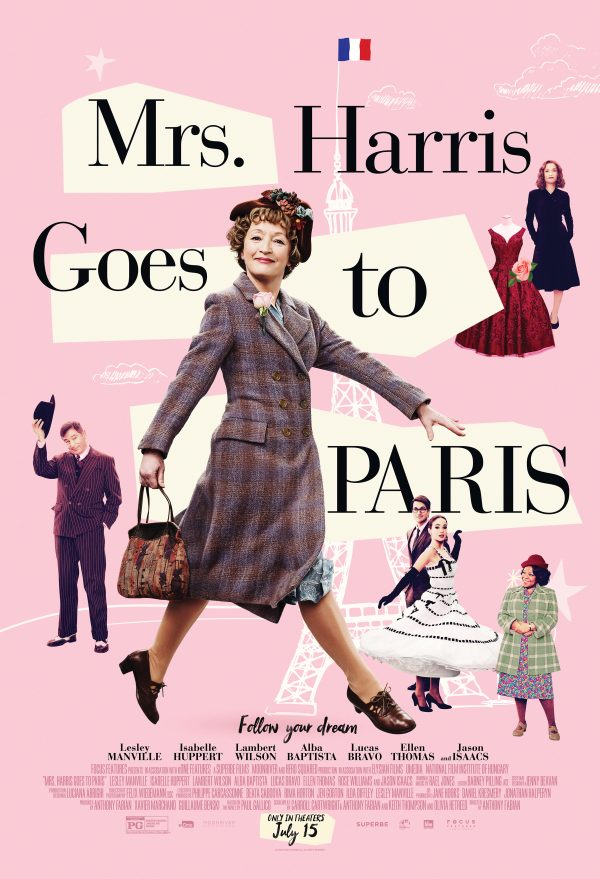
“Mrs. Harris Goes to Paris” (2022). Cast: Lesley Manville, Isabelle Huppert, Jason Isaacs, Alba Baptista, Lucas Bravo, Ellen Thomas, Rose Williams, Anna Chancellor, Lambert Wilson, Guillaine Londez, Freddie Fox, Roxane Duran, Philippe Bertin, Bertrand Poncet, Delroy Atkinson, Christian McKay. Director: Anthony Fabian. Screenplay: Anthony Fabian, Carroll Cartwright, Keith Thompson and Olivia Hetreed. Book: Paul Gallico, Mrs. ʼArris Goes to Paris (1958). Web site. Trailer.
We all have dreams, and we’d like to see them realized. However, many of us believe they’re unreachable objectives, pie-in-the-sky goals that can be envisioned though never experienced. But must that be the case? Is there no chance of them ever being materialized? It all comes back to those aforementioned beliefs, notions that can make all the difference, as illustrated in the delightful new period piece comedy, “Mrs. Harris Goes to Paris.”
Working class London cleaning woman Ada Harris (Lesley Manville) leads a humble, sprightly, breezy life, but there’s an underpinning of melancholy beneath that cheery façade. It’s been 13 years since her husband, Eddie, went missing in action during World War II, yet she hopefully clings to the notion that he’ll somehow show up in her life again one day. In the meantime, she’s watched time pass her by, reconciling her to a meager existence. She’s been saddled with a need to work to make ends meet, mostly for unappreciative, irresponsible clients who are often in arrears when it comes to paying her for her services, forcing her to take in piecework sewing jobs to cover her expenses. And, personally speaking, there’s been no romance and little companionship in her life, save for occasional trips to the local pub with her friend, Vi (Ellen Thomas), where she matches wits with the resident barfly, Archie (Jason Isaacs). Still, despite these circumstances, Ada does her best to keep a smile on her face, forced though it may be at times.
Ironically, despite her challenges, Ada is usually the first person to step in when others need assistance. That’s apparent, for example, in her dealings with one of her clients, Pamela (Rose Williams), a young, beautiful but flighty aspiring actress. Ada frequently helps her out of tight spots, such as when she frantically needs to prepare for auditions for which she’s anything but ready. One might wonder why she’d make the effort to do this, but, as someone who knows hardship, Ada is only too happy to help when she can.
Of course, there are those who don’t hesitate to take advantage of Ada’s kindness, too, such as one of her supposedly affluent clients, Lady Dant (Anna Chancellor), who is perpetually behind in settling her accounts. She routinely makes feeble excuses whenever Ada broaches the subject, always making, but never keeping, her promises as the money she owes continues to mount. Ada manages to maintain her composure through these episodes, though it’s increasingly obvious she’s unhappy at being taken for granted.
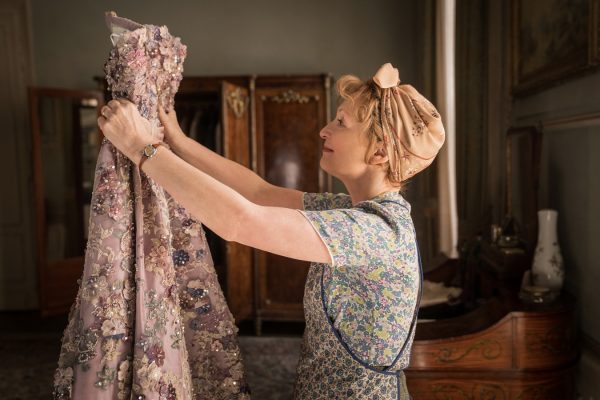
Indeed, when one comes down to it, Ada asks for precious little out of life – just the basics with no need for extravagances. Well, maybe except for one, that is.
While working at Lady Dant’s home one day, Ada spies a gorgeous new Christian Dior gown that she purchased for her daughter’s upcoming wedding. She looks on in rapt admiration, wishing that she could have one like it for herself. But, when Lady Dant tells Ada how much she paid for it – £500 – the wind goes out of her sails. However, if nothing else, Ada is famous for holding out hope; just look at how long she has held fast to the idea that her beloved Eddie might return. And she draws on this reserve of optimism in thinking that somehow, someday, she, too, will have such a dress of her own.
It’s at this point when the wheel of fortune begins unexpectedly spinning in her favor. When an RAF officer (Freddie Fox) officially notifies Ada of Eddie’s demise, she learns that she’s entitled to a generous military widow’s pension. On top of that, she comes into money from winnings at the local dog track. And, when she adds it all up, she realizes she’s amassed sufficient funds to take a trip to Paris to visit the House of Dior to purchase her own haute couture gown.
Once in the City of Lights, however, Ada quickly discovers she’s a proverbial fish out of water. For instance, she has no understanding of how one goes about acquiring a Dior original. She walks into the salon expecting to paw through racks of frocks as if she were shopping at the neighborhood Woolworth’s. And, when Ada encounters members of Dior’s staff, such as Mme. Colbert (Isabelle Huppert), the snooty salon manager, she’s instantly made to feel as though she doesn’t belong – and must be hurried away, given that she’s arrived at a highly inopportune time: the day when the House is staging a showing of its latest collection. However, when Ada grasps what’s happening to her, she stands up for herself and claims she’s entitled to attend Dior’s sartorial soiree, saying that she arrived before any of the other invited guests – and that since she has cold, hard cash in hand to make a purchase on the spot.
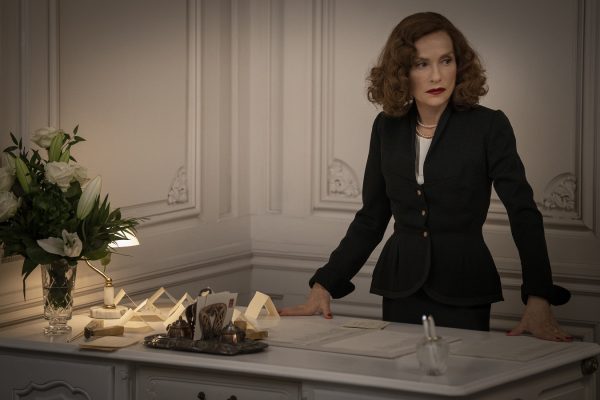
When Ada pulls out the wads of money from her purse, the attitude among Dior’s staff quickly shifts. The salon’s finance director, André Fauvel (Lucas Bravo), is particularly accommodating toward the unexpected arrival; after all, given the financial difficulties that the House has been experiencing, he’s only too happy to accept hard currency in exchange for one of Dior’s designs, especially since many other “clients” are notorious for being demanding but not paying on time (if at all). André welcomes Ada warmly and introduces her to some of the event’s high-profile guests, such as the elegant and charming Marquis de Chassagne (Lambert Wilson), a widowed nobleman who treats her with a level of attention and civility she’s never experienced.
Of course, there are others who aren’t nearly as genial, such as the eminently pompous and condescending Mme. Avallon (Guillaine Londez), wife of the city’s “garbage king” (whose workers, incidentally, are on strike at the moment, leaving the streets of Paris mercilessly strewn with trash). The very thought of having to sit next to a commoner like Ada during the fashion show positively infuriates the malcontented high-brow, prompting her to engage in deliberate acts of spite, just because she feels she can.
This event represents a turning point in Ada’s life, not only in terms of fulfilling her aspiration of acquiring the dress of her dreams, but also in reinventing herself. It’s a transformation that allows her to retain her best qualities while putting them to use for the betterment of her own life and those of others. For example, she draws upon this opportunity to put her capacity to help others to use once again, only this time in a bigger and more meaningful way. This becomes apparent when she plays the part of an impromptu matchmaker for André and one of the House’s models, Natasha (Alba Baptista). She also encourages Natasha to pursue her study of philosophy, an impassioned undertaking she finds far preferable to being a model, despite her stunning beauty. At the same time, she urges André to meet with M. Dior (Philippe Bertin) to explain his plan for helping to financially save the sinking design House, a proposal that could change the fortunes of both.
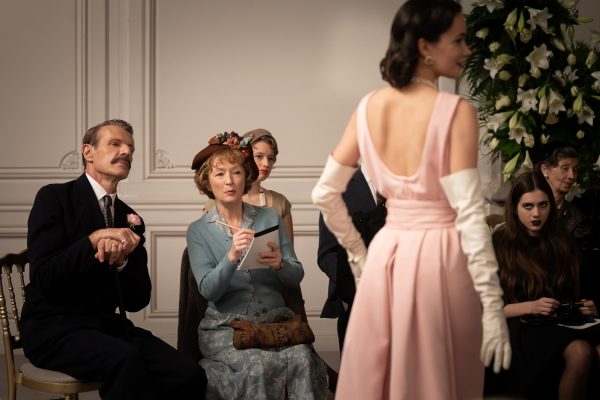
Ada uses this opportunity to change herself as well. Through her connection with the Marquis, for instance, she discovers that it may not be too late for romance. She also finds, in many ways, that she need not have to continue allowing others to treat her badly or to take advantage of her. She’s just as entitled as the blue bloods to the good things in life, even if she doesn’t have all of the elitist trappings possessed by others who are allegedly more sophisticated (many of which prove to be phony, by the way). And, as Ada develops a heightened sense of discernment about these questions, she comes to understand and appreciate what truly matters most in life – regardless of what dress they’re clothed in.
Ada’s trip to Paris thus turns out to be more than just for the purchase of an evening gown. She’s at last able to morph into the butterfly that had long been hidden inside her. It really is an experience in learning to see how our dreams can indeed some true. It’s an outcome that need not be limited to the realm of fairy tales. And it’s comforting to know that we can follow Ada’s lead and realize the same kinds of results for ourselves, no matter what we may be wearing.
In many ways, “Mrs. Harris” is a textbook primer on how to make our dreams come true. And, to a great degree, it draws from the conscious creation process, the philosophy that maintains we manifest our existence through the power of our thoughts, beliefs, intents, and, in this context, our dreams, which, in essence, are derivations of the foregoing. Through Ada’s experiences, we see how these aspirations materialize, even if they don’t necessarily take the routes we’d expect them to. But eventually these cherished conceptions arise, despite taking some seemingly wrong turns along the way.
When such misdirections emerge, it might be tempting and all too easy for us to give up on our dreams ever coming true. However, if we trust the process and hold fast to our beliefs, we realize that these seemingly erroneous turns are actually meant to guide us to what we need and want to make our dreams spring to life. An unexpected left turn, for instance, may lead us to a fortuitous synchronicity that enables all of our plans to fall into place, something we’d miss entirely if fortunes took us in the direction that we thought needed to be followed.
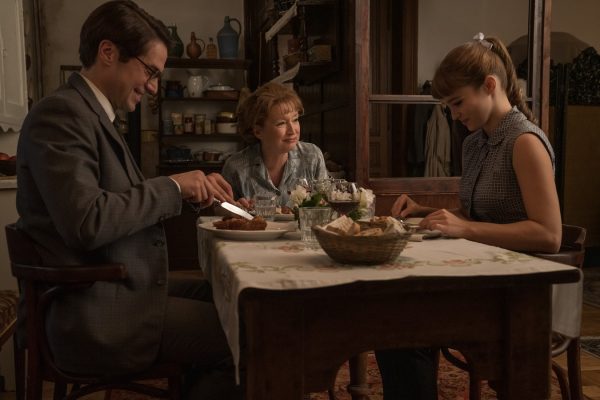
From this, it’s obvious that faith is an integral component in making this process unfold. And that’s important to recognize in that faith is itself a form of belief, one whose presence needs to be incorporated into the mix of beliefs driving the process of bringing us what we seek. It need not be employed in an extreme, obsessive form, as that actually might suggest a lack of trust that could undermine the manifestation process, but it needs to be present to a sufficient degree to signal that we’re comfortable with, and confident about, what’s going to result.
To make this work, we also need to rule out any potential impact that fears, doubts and limitations might have on this process, as beliefs in these elements can all undercut matters to a point where our dreams manifest either in distorted forms or not at all. One can see this to an extent with Ada at the opening of the film, where her long-held uncertainties about Eddie’s fate have kept her locked in place for 13 years. Her doubts about what happened, her fears of knowing the truth and the limitations that she has allowed to be imposed on her life have all kept her stuck in a less-than-satisfactory life. The result of that has been a financially strapped existence without romance and virtually no prospects of seeing any of her dreams come true. However, when she unshackles herself from such metaphorical millstones, things begin to change in big and better ways. And who would think that such an outcome could arise from something as simple as a change in outlook? Indeed, anyone who understands that is well on the path to seeing his or her dreams come to life.
Of course, to see this process through, one must also be careful not to become a doe-eyed Pollyanna, either. Our clarity of thought and personal integrity – hallmarks of our true self – may well be tested along the way. These “tests” often challenge our ability to spot what works and what doesn’t in the fulfillment of our wishes. They help us identify pitfalls that can derail our plans by sharpening our powers of discernment. Some seemingly valuable influences, for example, may be helpful to certain aspects of the process, but that doesn’t necessarily mean their assistance will be never-ending; at some point, their usefulness may run its course, at which time they need to be jettisoned, because they can become dead weight or a hindrance if allowed to persist. Letting go of these influences may be difficult but nevertheless necessary if we’re to carry forward, a lesson that can subsequently challenge our faith, too. However, if we hone our discernment skills, we stand a much better chance of seeing things through to the outcome we hope for.
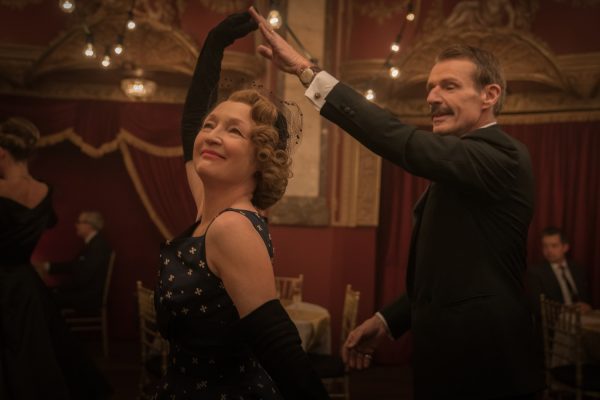
A keen sense of discernment can also help us see what’s truly most important. Ada comes to appreciate this as she wends her way through her adventure. The glitz, glamour and elegance of haute couture and the high life may indeed be quite seductive. But is it genuinely everything it’s cracked up to be? Is there a wisdom and mature sophistication behind the façade, or is it mere window dressing covering something inherently shallow? Are there aspects to life that are more important and more meaningful than being able to display the latest aesthetic trappings? Moreover, what are we to think when we see the truly ugly aspects of this supposedly enviable lifestyle firsthand, such as the inexcusable behavior of Mme. Avallon and Mme. Colbert, not to mention the garbage-laden streets of a city as allegedly unassailably elegant as Paris? These are determinations we must often make in situations like this, and that can be difficult, especially when the style hounds attempt to thrust attitude upon those of us who aren’t in their league of haughty fashion plates. Are their attempts at intimidation to be taken seriously, or are they merely defense mechanisms designed to cover a lack of knowledge of something more substantial? (Ask Ada if you want the answer to that.)
This is especially true when it comes to the exclusivity factor often associated with the high fashion world. Mme. Colbert, for example, prides herself on the reputation that Dior has established for itself as one of the most exclusive design houses in Paris, if not the world. Yet it’s become so select that it’s brought itself to the brink of financial calamity. What’s smart about that? Indeed, why can’t others (i.e., the average, everyday consumer) enjoy the good things in life just as readily as the financial elite do (especially given their level of fiscal irresponsibility)? Are the heads of the House so unenlightened that they can’t see the value in that? Where is their power of discernment? Ada’s influence in this scenario thus carries the seeds of helping Dior see its dreams come true, too – a new market and a stable financial footing for the future, all made possible by helping the organization’s leadership see what’s possible with a shift in beliefs.
Ada’s role in this development brings to light perhaps the most significant theme to come out of this story – that of living one’s destiny. Ada has spent 13 years patiently paying her dues while holding a number of dreams at bay, but now it’s time for her to liberate them, to see them come true. And it’s a valuable skill that she can employ not only for herself, but also for others by showing them the way to realize their dreams. This is a conscious creation practice known as value fulfillment, through which we live our lives as our best, truest selves for our own benefit and betterment, as well as that of those around us. This is certainly apparent in how Ada’s odyssey plays out, but it’s also significant in the lives of many others around her, such as André, Natasha, the Marquis, M. Dior and even Mme. Colbert. There’s much to be said for that. But, then, after all, who wouldn’t want to see their dreams come true?
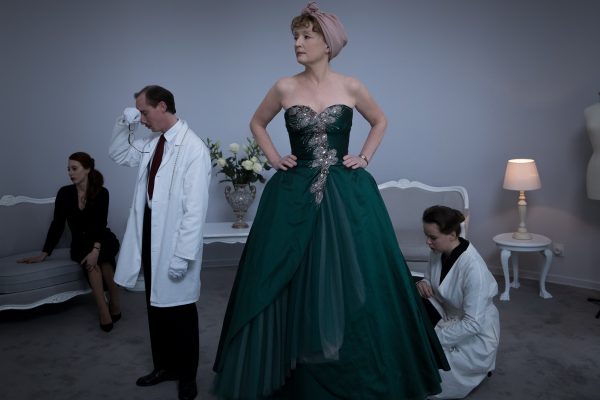
What might at first glance seem like a wispy bit of comedic fluff actually serves up more substance than expected, all dressed up in a deliciously charming package. Based on the 1958 novel by author Paul Gallico, writer-director Anthony Fabian’s third narrative feature tells the fantasy-like tale of a widowed working class English cleaning woman who, through a series of remarkable synchronicities, gets her chance to live her dreams. But, while on an impromptu trip to Paris, she becomes the beneficiary of much, much more as a result of a number of wondrous, magical experiences that “inadvertently” give her and others what’s needed – and what’s wished for. This engaging, uplifting tale thus waxes reminiscent of other films like this, such as the delightful offering “Under the Tuscan Sun” (2003). While the picture’s pacing could use some shoring up in the first act, the film nevertheless delivers solidly thereafter, with moments of triumph, bittersweet romance and heart-tugging joy. Credit the fine ensemble cast for making it all work, especially protagonist Lesley Manville and her persnickety and wickedly funny foil Isabelle Huppert. Then there are the positively gorgeous costumes, which are a feast for the eyes, an achievement that richly deserves to be rewarded come awards season. Indeed, don’t be misled by the seemingly saccharin-encrusted marketing for this one; there’s more to this sweet little charmer than you might think. The film is currently playing in theaters and online.
Wouldn’t it be ideal if we could always make our dreams come true? Given our current level of proficiency at this, we may not yet be adept enough to make that happen all the time, but, considering that many of us think it’s fundamentally impossible, we’ll never make any progress toward that goal until we become at least somewhat practiced at this skill. And, as Mrs. Harris proves, that’s entirely attainable. However, first we must convince ourselves that we can get that far to start with, which itself can be looked upon as a dream capable of being fulfilled. That’s a good place to begin, and, after all, we have to start somewhere. But, if we take that step, there’s no telling where it might ultimately lead us. And wouldn’t that be a dream come true!
Copyright © 2022, by Brent Marchant. All rights reserved.



